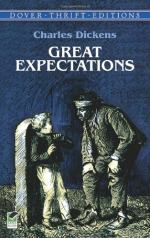As we began to be more used to one another, Miss Havisham talked more to me, and asked me such questions as what had I learnt and what was I going to be? I told her I was going to be apprenticed to Joe, I believed; and I enlarged upon my knowing nothing and wanting to know everything, in the hope that she might offer some help towards that desirable end. But, she did not; on the contrary, she seemed to prefer my being ignorant. Neither did she ever give me any money — or anything but my daily dinner — nor ever stipulate that I should be paid for my services.
Estella was always about, and always let me in and out, but never told me I might kiss her again. Sometimes, she would coldly tolerate me; sometimes, she would condescend to me; sometimes, she would be quite familiar with me; sometimes, she would tell me energetically that she hated me. Miss Havisham would often ask me in a whisper, or when we were alone, “Does she grow prettier and prettier, Pip?” And when I said yes (for indeed she did), would seem to enjoy it greedily. Also, when we played at cards Miss Havisham would look on, with a miserly relish of Estella’s moods, whatever they were. And sometimes, when her moods were so many and so contradictory of one another that I was puzzled what to say or do, Miss Havisham would embrace her with lavish fondness, murmuring something in her ear that sounded like “Break their hearts my pride and hope, break their hearts and have no mercy!”
There was a song Joe used to hum fragments of at the forge, of which the burden was Old Clem. This was not a very ceremonious way of rendering homage to a patron saint; but, I believe Old Clem stood in that relation towards smiths. It was a song that imitated the measure of beating upon iron, and was a mere lyrical excuse for the introduction of Old Clem’s respected name. Thus, you were to hammer boys round — Old Clem! With a thump and a sound — Old Clem! Beat it out, beat it out — Old Clem! With a clink for the stout — Old Clem! Blow the fire, blow the fire — Old Clem! Roaring dryer, soaring higher — Old Clem! One day soon after the appearance of the chair, Miss Havisham suddenly saying to me, with the impatient movement of her fingers, “There, there, there! Sing!” I was surprised into crooning this ditty as I pushed her over the floor. It happened so to catch her fancy, that she took it up in a low brooding voice as if she were singing in her sleep. After that, it became customary with us to have it as we moved about, and Estella would often join in; though the whole strain was so subdued, even when there were three of us, that it made less noise in the grim old house than the lightest breath of wind.
What could I become with these surroundings? How could my character fail to be influenced by them? Is it to be wondered at if my thoughts were dazed, as my eyes were, when I came out into the natural light from the misty yellow rooms?




